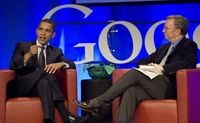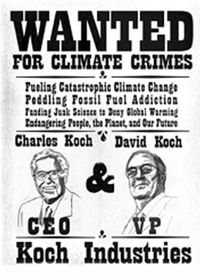 The great unwritten political story of 2015 is the turn of technology, from being covertly involved in politics to being overtly involved in it.
The great unwritten political story of 2015 is the turn of technology, from being covertly involved in politics to being overtly involved in it.
There was considerable covert support for Barack Obama in 2007, highlighted by his appearance at Google, where he was given the answer to a question on databases so he could look even cleverer than he in fact was. When the teacher gives you the answer, it’s because he likes you.
 Since then, the oil industry has tightened its grip on Republican politics. A lot of liberal groups like to talk about the “Kochtopus,” the host of Astroturf, research, and political groups run by the Koch Brothers, who are the sons of John Birch Society founder Fred Koch and own the largest share of the Alberta tar sands play. But they’re not the only oil guys putting money into politics, haven’t been for ages. They are just the most sophisticated, and the most experienced. They are, in fact, bagmen for a host of oil company CEOs that have been putting their money to work in political influence for decades.
Since then, the oil industry has tightened its grip on Republican politics. A lot of liberal groups like to talk about the “Kochtopus,” the host of Astroturf, research, and political groups run by the Koch Brothers, who are the sons of John Birch Society founder Fred Koch and own the largest share of the Alberta tar sands play. But they’re not the only oil guys putting money into politics, haven’t been for ages. They are just the most sophisticated, and the most experienced. They are, in fact, bagmen for a host of oil company CEOs that have been putting their money to work in political influence for decades.
No single industry in the history of America has been so deeply enmeshed in politics as oil. After Standard Oil was broken up, the industry went both ways politically, supporting Republicans in Washington and Democrats in Texas, especially Lyndon Johnson. The decisive move to Republicans in the 1960s was first over social issues, then over support of GOP foreign policy and finally over economics.
The Nixon Era was also the oil era. The industry moved from back-room control to front-room control, electing Bush Sr. and Bush Jr. specifically to push the industry’s interest to the top of the political agenda. The fall of the House of Bush, in 2008, was also a fall in the house of oil.

For most of the last generation, technology looked upon all this with tolerance, then bemusement, and only recently ill-disguised contempt. Oil inflation covered up the deflationary impact of technology, and was in the tech industry’s own interest. The oil industry’s approach – its fumbles and foibles – led to bemusement, and a desire by technology executives to stay out of politics, which is inherently messy and makes enemies.
This has changed, mainly, because the oil industry’s politics now threaten technology industry profits. Most of today’s technologists also came of age politically inside the anti-thesis to the Nixon thesis of conflict. They understand that cooperation among economic actors is the key to successfully installing the host of new technologies now coming on-stream – conflict is counterproductive.

The big dog in the technology political bandwagon, however, is Apple CEO Tim Cook. Since coming out as gay, he has been pounding the table on liberal social issues, criticizing both society and his own industry for a lack of inclusiveness. He is not alone in his views, but the key point is that he represents almost three-quarters-of-a-billion dollars in market cap. His views are shared, quietly, by Google chairman Eric Schmidt, by former Microsoft CEO Bill Gates, and most of the industry’s other current leaders. These are guys who can buy-and-sell the Koch brothers.

But there is a growing consensus within the industry that a new political consensus is needed within the U.S. for the industry to grow. The Internet of Things demands trust, both in the technology and its results. Self-driving cars can’t happen if people assume they’re easily hacked, or that “big brother” is about to take them over. The same is true for medical applications. Wars for resources are costly, and the technology industry has little use for them. Technologists are engineers, which means they understand science, and they accept that the climate crisis is real.
All this represents the Obama Thesis in action. It is a new, broader center in American politics. But in 2016 it faces the vast wealth, political connections, and political acuity of the Koch people, who have succeeded by pushing their party further-and-further right, deliberately creating “others” who can then be then pushed outside the tent, beyond the “elect.” That’s what the Nixon Thesis is all about.

To a modern Republican, words like this are anathema. “Let them say of me I was one who believed in sharing the blessings I received.” What matters is power, nothing more and nothing less.
So what we’re going to see, over the next year, is more-and-more overt participation by the technology industry in our politics. If the industry fails in 2016, it will lead a new political movement afterward that will enforce this new consensus, because it is in the technology industry’s best interests. And business drives the political train.










